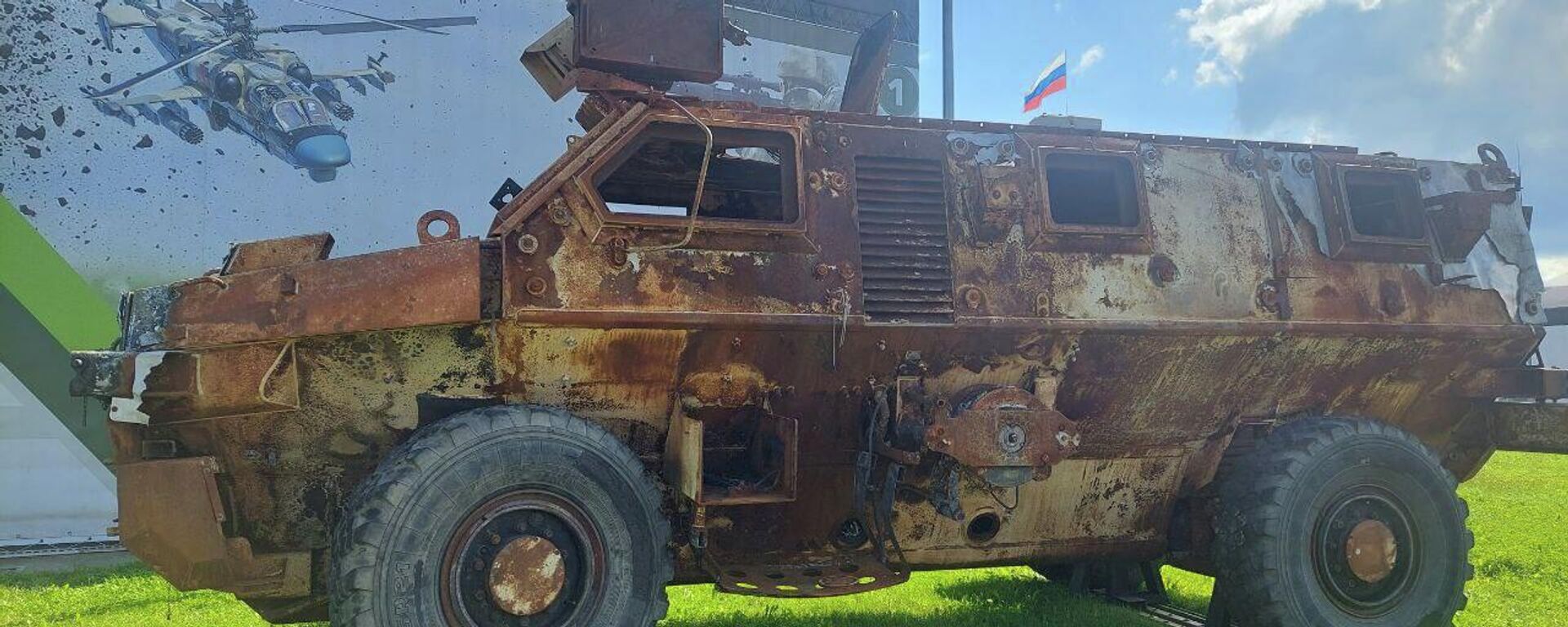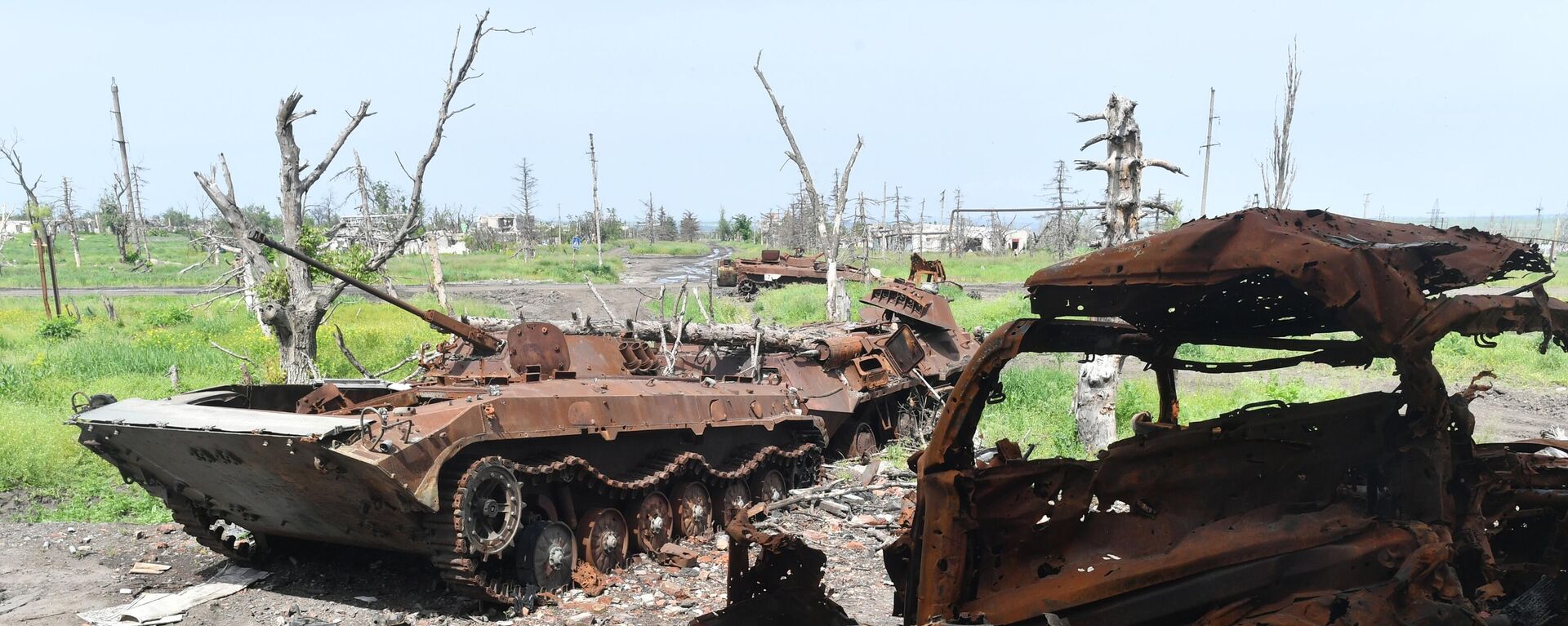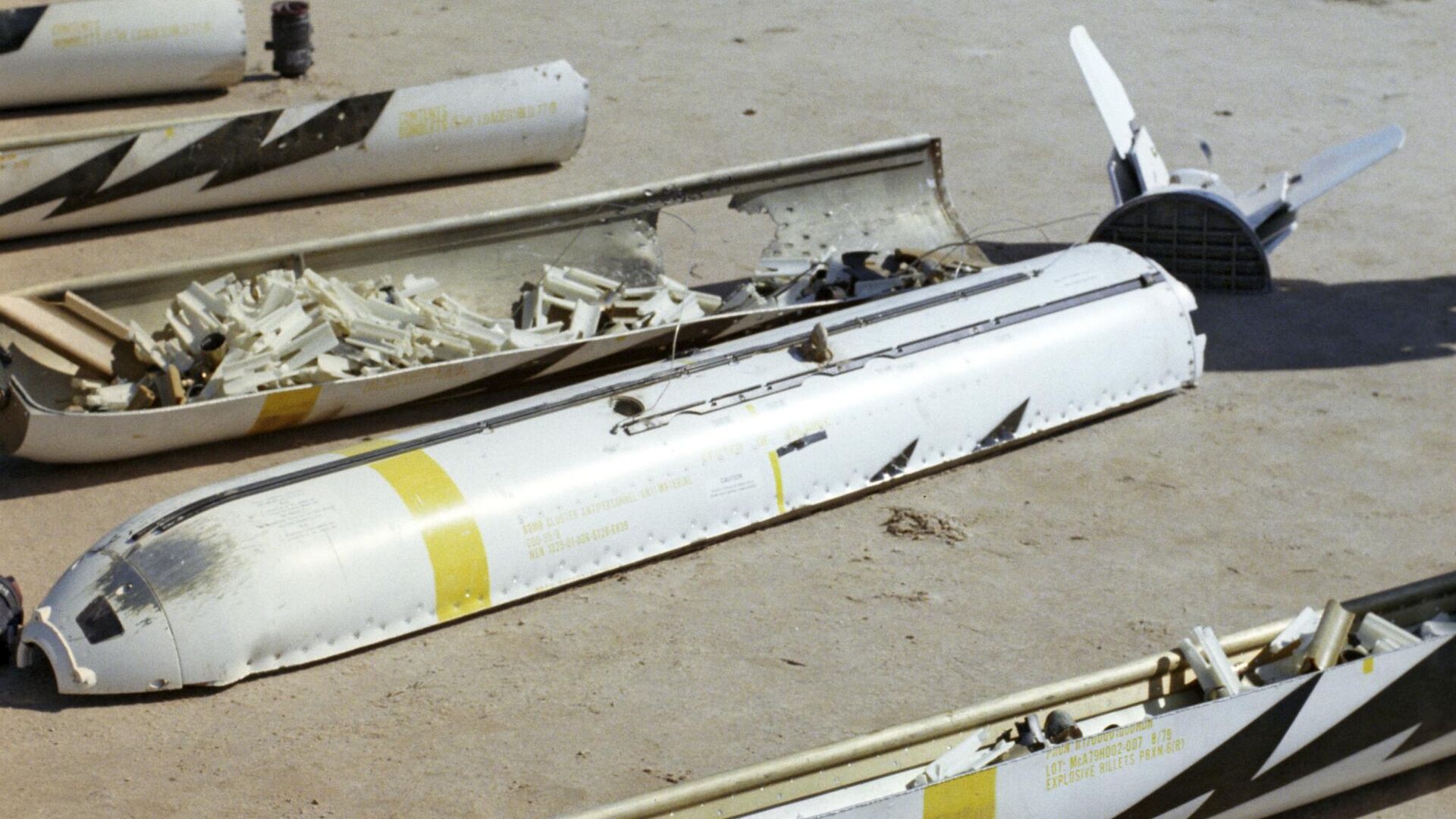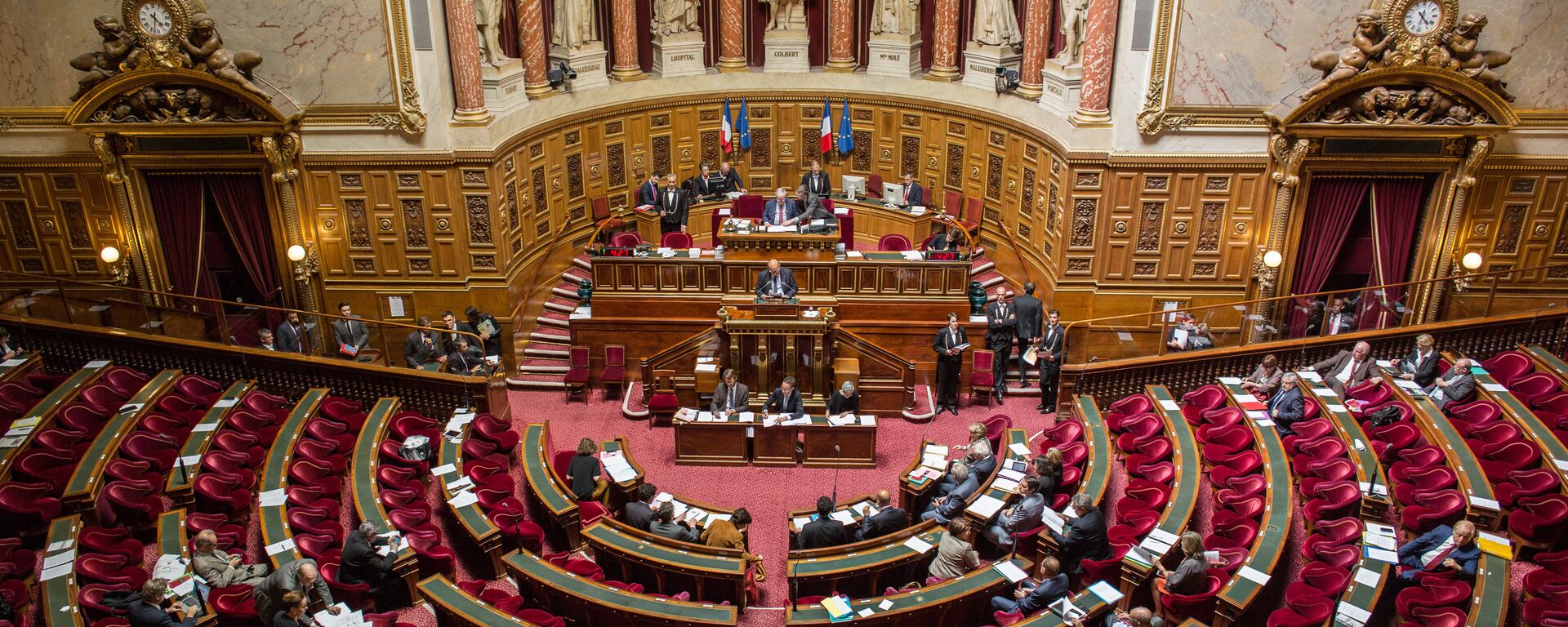https://sputnikglobe.com/20230815/how-russias-position-on-cluster-munitions-in-conflict-differs-from-us-1112621137.html
How Russia's Position on Cluster Munitions in Conflict Differs From US
How Russia's Position on Cluster Munitions in Conflict Differs From US
Sputnik International
If Russia decides to use cluster munitions in response to the US arming Ukraine with them, it will most likely be careful and calculated, since the Russians have to live with their neighbors afterward.
2023-08-15T17:57+0000
2023-08-15T17:57+0000
2023-08-16T07:00+0000
analysis
igor korotchenko
earl rasmussen
sergei shoigu
convention on cluster munitions
cluster munitions
ukraine
russia
https://cdn1.img.sputnikglobe.com/img/07e7/06/1c/1111529968_0:936:2048:2088_1920x0_80_0_0_bd4bed21860f8398e96631a7bed1246c.jpg
Speaking at an international security conference in Moscow on Tuesday, Russian Defense Minister Sergei Shoigu warned that the Russian military might soon be forced to “reconsider the decision” to refrain from using cluster munitions in Ukraine, due to Washington’s decision to arm Kiev with such weapons.A certain percentage of the tiny bomblets contained in each cluster bomb or artillery shell don’t immediately explode upon striking the munition’s target, and can be found later by animals or humans, with children being especially vulnerable since the bomblets can look like toys.Igor Korotchenko, a military analyst and editor-in-chief of National Defense magazine, told Sputnik on Tuesday that Moscow had showed restraint in deploying the highly effective antipersonnel weapons in the special operation in Ukraine due to its “responsible attitude to the use of such weapons,” which is different from Washington’s.Korotchenko emphasized that “the enemy himself determines what he is fighting with” and that “we cannot be holier than the Pope” during this conflict.“If the United States supplies such types of weapons, if Ukraine uses them, if there are no restrictions on the use of such weapons by the enemy - in my opinion, we cannot endlessly be in a situation of non-use of similar types of weapons,” the analyst said.Korotchenko said that if cluster munitions are to be used by Russian forces, their deployment would be “determined by military expediency” and “only against military targets” who are themselves using such weapons.“We are not at war with the peaceful population of Ukraine. We do not strike civilian targets. We are destroying either the military infrastructure or the infrastructure that Ukraine relies on to realize its military potential, offensive potential. But if we use any types of weapons, it is only against the enemy, an armed enemy who opposes us on the battlefield,” he explained.Earl Rasmussen, an international consultant and a retired lieutenant colonel with over 20 years in the US Army, told Sputnik that Russia’s considerations in when or whether to use cluster munitions would include balancing the needs of the tactical situation with a caution for humanitarian concerns.“Russia has sufficient ammunition to not have to rely on cluster munitions,” he said, noting that ”if cluster munitions are used, then the Russians will have to actually move through that area or to deal with the area afterwards. Either when they're moving forward to obtain more area within Ukraine or for defensive positions or the people living in that area. You're going to have a large part of the area contaminated, I would like to say, with the cluster munitions. And that becomes very dangerous for civilians as well, especially children. I would be very cautious using them.”Rasmussen noted that despite not being a member of the Convention on Cluster Munitions - which is also true of the US, China and several other countries - Russia still carefully considers the “huge humanitarian issue” of deciding to use them.“I think we all know that there's a huge humanitarian issue related to cluster munitions and that regardless of whether it's a low percentage or a high percentage, a certain percentage of [the bomblets] are just duds - they do not go off at the time and they're embedded basically within the ground for years. We [the Americans] used them in Vietnam, we used them in - probably - Iraq and Afghanistan. And we're still dealing with people dying from those unexploded munitions.”“Usually you're going to use cluster munitions when you're confronting massive troop movements, so using normal artillery doesn't really make sense. They're more from dispersing formations and a large counterattack or a large defensive position or offensive position that you're trying to break up and inflict massive casualties. There's been no reason from a strategic or tactical point of view for Russia to use them so far. Maybe Bakhmut [Artemovsk], that could have been a potential area. And we'll have to see what the tactical situation looks like on the ground. I do not think they will.”He added that if Russia did decide to use cluster munitions, however justified it might be, Moscow would have to consider the perspectives of its partners outside of Europe with a firmer stance against the weapons and how it could maintain a “moral high ground” while doing so.The retired US Army colonel noted that Washington has never shown such scruples when it comes to deciding what kinds of weapons to use when bombing countries far from home. In contrast, Russia has to live with Ukraine after the conflict is over and see the bombed areas rebuilt, so it has not been so cavalier.“Western countries, the US specifically, would be going to completely carpet bomb and destroy infrastructure - power, bridges, just flatten cities. Look what we've done to Belgrade, look what we did in Afghanistan, look what we did in Iraq, to Baghdad. I mean, we just went in and just focused, you know, two-three months of bombing - and then we moved in. You basically have destroyed the country before you are even in.”He noted the situation in Ukraine, where Russia had clearly hoped the West would quickly come to their senses about the seriousness of Moscow’s security red lines after the special operation was launched in February 2022, was “complicated” and “not ideal.”"But Russia has got a more strategic long term perspective, and especially in this case, having to deal with the people as well and help rebuild, especially the four regions that they have, and maybe two or three more regions. Whereas the West really has never gone in to rebuild afterwards, and even if they've pulled out, like in Afghanistan, they've confiscated the reserves of the government. I think the reasoning behind this is completely different.”
https://sputnikglobe.com/20230815/western-weapons-captured-in-ukraine-displayed-at-army-2023-military-expo-in-russia-1112613701.html
https://sputnikglobe.com/20230814/john-bolton-claims-failure-of-kievs-counteroffensive-caused-by-wests-indecisiveness-1112579409.html
https://sputnikglobe.com/20230808/niger-crisis-sparks-fears-in-france-that-paris-being-squeezed-out-of-africa-by-russia-china-us-1112457076.html
ukraine
russia
Sputnik International
feedback@sputniknews.com
+74956456601
MIA „Rossiya Segodnya“
2023
News
en_EN
Sputnik International
feedback@sputniknews.com
+74956456601
MIA „Rossiya Segodnya“
Sputnik International
feedback@sputniknews.com
+74956456601
MIA „Rossiya Segodnya“
cluster munitions; sergey shoigu; ukraine; special operation
cluster munitions; sergey shoigu; ukraine; special operation
How Russia's Position on Cluster Munitions in Conflict Differs From US
17:57 GMT 15.08.2023 (Updated: 07:00 GMT 16.08.2023) A Russian and an American military expert told Sputnik that if Russia decides to use cluster munitions in response to the US arming Ukraine with the same weapons, it will most likely be careful and calculated, since unlike with American military interventions, the Russians have to live with their neighbors afterward.
Speaking at an international security conference in Moscow on Tuesday, Russian Defense Minister Sergei Shoigu warned that the Russian military might soon be forced to “reconsider the decision” to refrain from using cluster munitions in Ukraine, due to Washington’s decision to arm Kiev with such weapons.
"The consequences of the use of such weapons for the civilian population are known. Before, American representatives have repeatedly stated that the use of cluster munitions is a war crime," Shoigu said. "Today, Washington and its accomplices are committing this crime in Ukraine. There is no condemnation from humanitarian organizations, as expected.”
A certain percentage of the tiny bomblets contained in each cluster bomb or artillery shell don’t immediately explode upon striking the munition’s target, and can be found later by animals or humans, with children being especially vulnerable since the bomblets can look like toys.
Igor Korotchenko, a military analyst and editor-in-chief of National Defense magazine, told Sputnik on Tuesday that Moscow had showed restraint in deploying the highly effective antipersonnel weapons in the special operation in Ukraine due to its “responsible attitude to the use of such weapons,” which is different from Washington’s.
“The question of how long we will be engaged in this abstinence, and how much it will further meet our interests is, of course, an open question,” he said. “It is quite obvious that as long as the enemy does not hesitate in choosing the means of destruction - and, despite our efforts to demonstrate goodwill, continues to use them - in fact, the question remains open. Will we continue to adhere to the restrictions that we voluntarily assumed or not? It is obviously a political and military decision by the Russian leadership and the leadership of the Ministry of Defense. We behave as our morals, our tasks and the situation dictate to us. In my opinion, this will not continue forever.”
Korotchenko emphasized that “the enemy himself determines what he is fighting with” and that “we cannot be holier than the Pope” during this conflict.

15 August 2023, 13:20 GMT
“If the United States supplies such types of weapons, if Ukraine uses them, if there are no restrictions on the use of such weapons by the enemy - in my opinion, we cannot endlessly be in a situation of non-use of similar types of weapons,” the analyst said.
“In the end, everything is determined by the real situation that develops. We cannot act to the detriment of ourselves. We may not use them for a while, and then, obviously, the question will arise that they will need to be used,” he said. “But once again, this is my expert point of view.”
Korotchenko said that if cluster munitions are to be used by Russian forces, their deployment would be “determined by military expediency” and “only against military targets” who are themselves using such weapons.
“We are not at war with the peaceful population of Ukraine. We do not strike civilian targets. We are destroying either the military infrastructure or the infrastructure that Ukraine relies on to realize its military potential, offensive potential. But if we use any types of weapons, it is only against the enemy, an armed enemy who opposes us on the battlefield,” he explained.
Earl Rasmussen, an international consultant and a retired lieutenant colonel with over 20 years in the US Army, told Sputnik that Russia’s considerations in when or whether to use cluster munitions would include balancing the needs of the tactical situation with a caution for humanitarian concerns.
“Russia has sufficient ammunition to not have to rely on cluster munitions,” he said, noting that ”if cluster munitions are used, then the Russians will have to actually move through that area or to deal with the area afterwards. Either when they're moving forward to obtain more area within Ukraine or for defensive positions or the people living in that area. You're going to have a large part of the area contaminated, I would like to say, with the cluster munitions. And that becomes very dangerous for civilians as well, especially children. I would be very cautious using them.”
“And so I would think that, unless there is a strategic or tactical reason to, I do not see the Russians actually using them, unless for some reason they need to counter it - not just because the Ukrainians use it. We know why that is, they really don't care about human life on the civilian side. And it's the only ammunition they [Ukraine] really have because there's limited supply of normal artillery ammunition. I would hope that they do not and I would think they would tend not to, but it all depends on the strategic and tactical situation on the ground.”
Rasmussen noted that despite not being a member of the Convention on Cluster Munitions - which is also true of the US, China and several other countries - Russia still carefully considers the “huge humanitarian issue” of deciding to use them.

14 August 2023, 13:12 GMT
“I think we all know that there's a huge humanitarian issue related to cluster munitions and that regardless of whether it's a low percentage or a high percentage, a certain percentage of [the bomblets] are just duds - they do not go off at the time and they're embedded basically within the ground for years. We [the Americans] used them in Vietnam, we used them in - probably - Iraq and Afghanistan. And we're still dealing with people dying from those unexploded munitions.”
“I think from a humanitarian point, the Russians haven't needed to” use cluster munitions yet, he pointed out.
“Usually you're going to use cluster munitions when you're confronting massive troop movements, so using normal artillery doesn't really make sense. They're more from dispersing formations and a large counterattack or a large defensive position or offensive position that you're trying to break up and inflict massive casualties. There's been no reason from a strategic or tactical point of view for Russia to use them so far. Maybe Bakhmut [Artemovsk], that could have been a potential area. And we'll have to see what the tactical situation looks like on the ground. I do not think they will.”
He added that if Russia did decide to use cluster munitions, however justified it might be, Moscow would have to consider the perspectives of its partners outside of Europe with a firmer stance against the weapons and how it could maintain a “moral high ground” while doing so.
“I would assume, before they use [cluster munitions] they would be in consultation with their friendly countries like China or Iran or other countries, African countries. They need to try to balance and take the high ground morally to maintain this pseudo-alliance and the neutrality of other countries. So if you go against something that they're against - let's say a lot of these countries are on the treaty and are against cluster bombs, and I can see why African countries would be or Southeast Asian countries would be or Middle East countries would be, because they suffered the result of the colonial use of them - but you've got to look at it from a political foreign policy perspective, I think, unless it was absolutely necessary, taking a moral high ground would be not to use them. And I think that would create a better relationship and continue to hold the support of nonaligned countries.”
The retired US Army colonel noted that Washington has never shown such scruples when it comes to deciding what kinds of weapons to use when bombing countries far from home. In contrast, Russia has to live with Ukraine after the conflict is over and see the bombed areas rebuilt, so it has not been so cavalier.
“Western countries, the US specifically, would be going to completely carpet bomb and destroy infrastructure - power, bridges, just flatten cities. Look what we've done to Belgrade, look what we did in Afghanistan, look what we did in Iraq, to Baghdad. I mean, we just went in and just focused, you know, two-three months of bombing - and then we moved in. You basically have destroyed the country before you are even in.”
“The difference here is, Russia was looking at one: they wanted to minimize civilian casualties, which typically the West really doesn't care about. And two: they knew that they're going to have to live with them afterwards as well. And you want to provide that capability to develop those regions again as well, although the emotions are running high. They’re split back and forth within Ukraine itself. So we'll have to see how that ends up.”
He noted the situation in Ukraine, where Russia had clearly hoped the West would quickly come to their senses about the seriousness of Moscow’s security red lines after the special operation was launched in February 2022, was “complicated” and “not ideal.”
"But Russia has got a more strategic long term perspective, and especially in this case, having to deal with the people as well and help rebuild, especially the four regions that they have, and maybe two or three more regions. Whereas the West really has never gone in to rebuild afterwards, and even if they've pulled out, like in Afghanistan, they've confiscated the reserves of the government. I think the reasoning behind this is completely different.”





